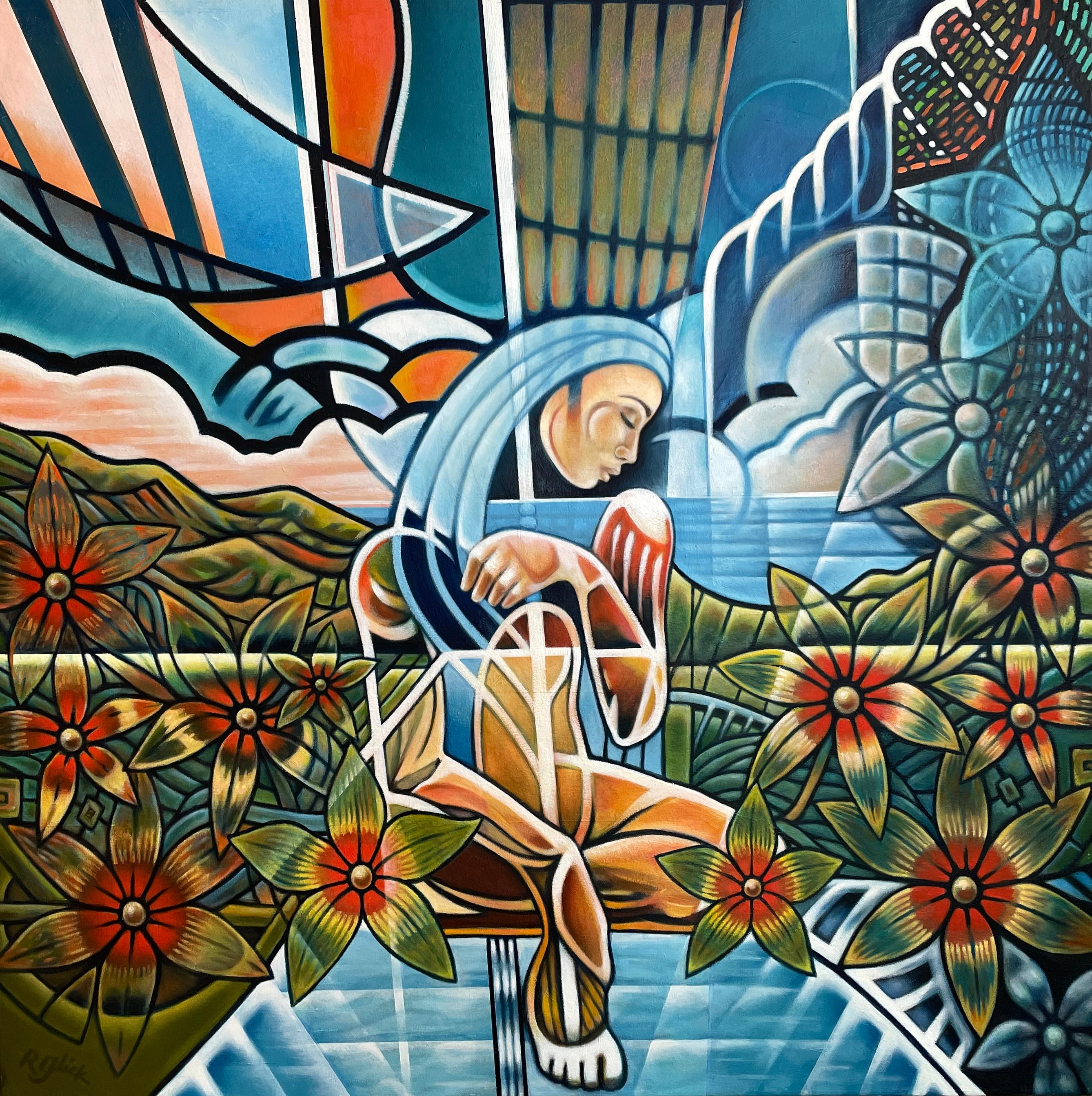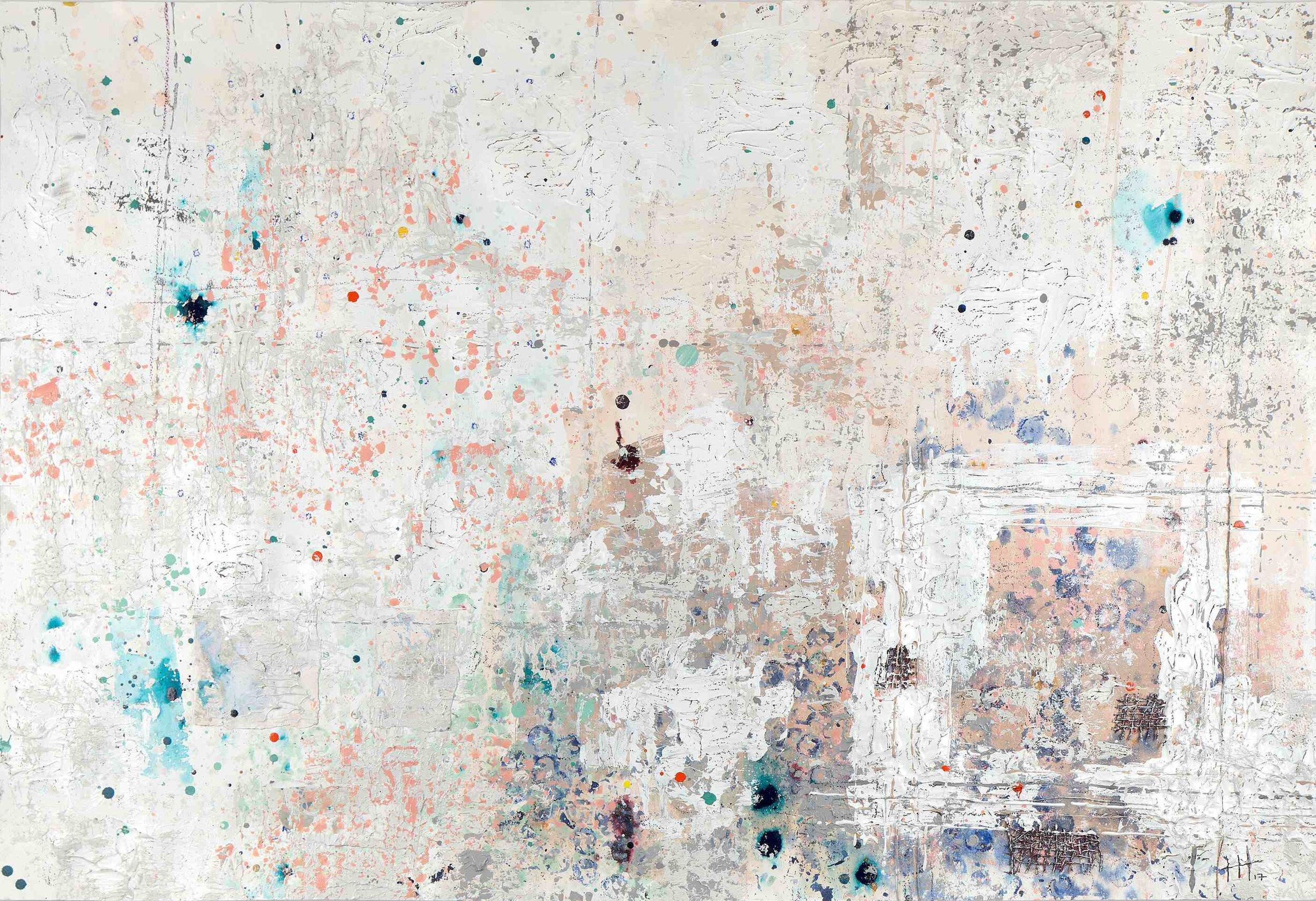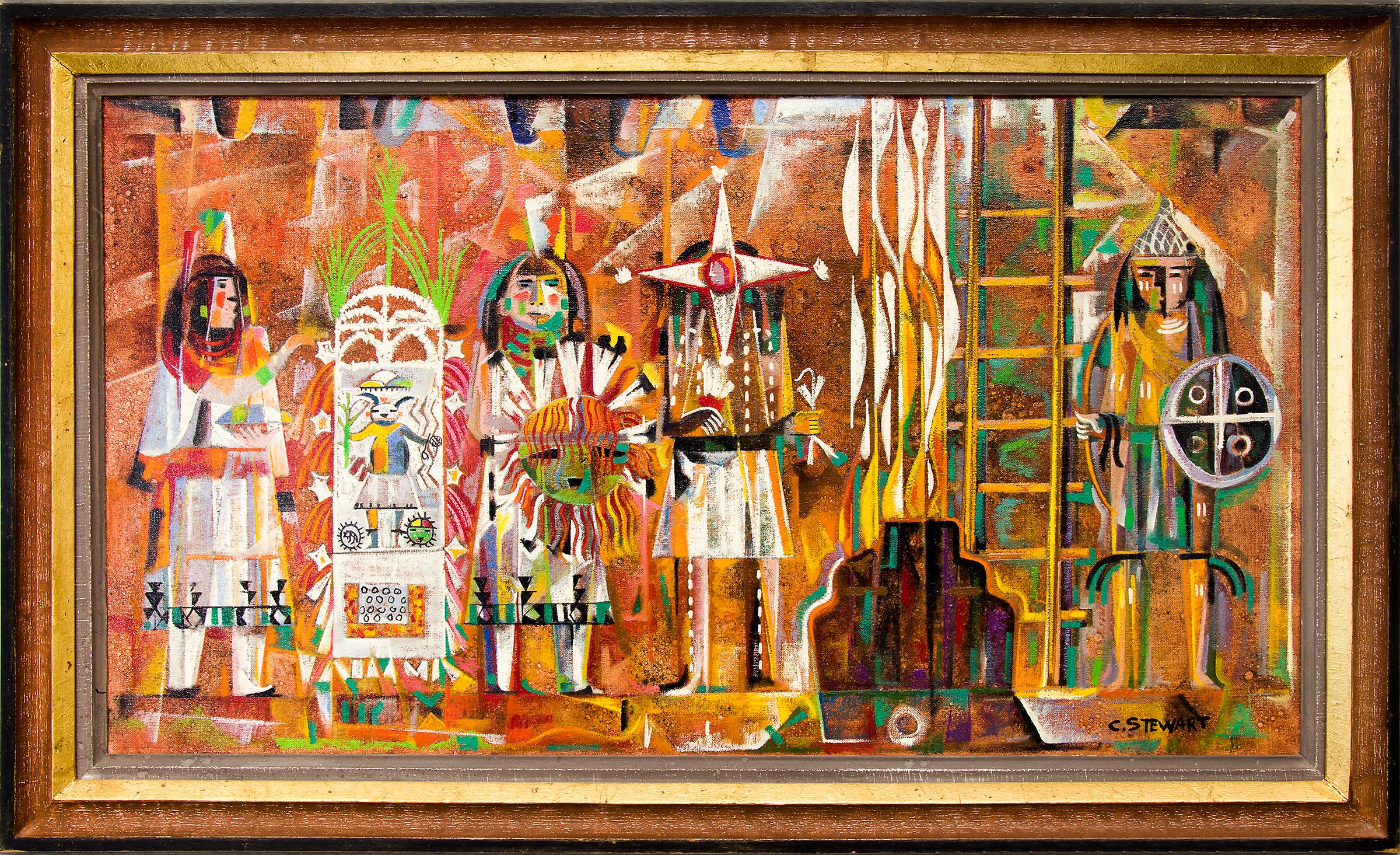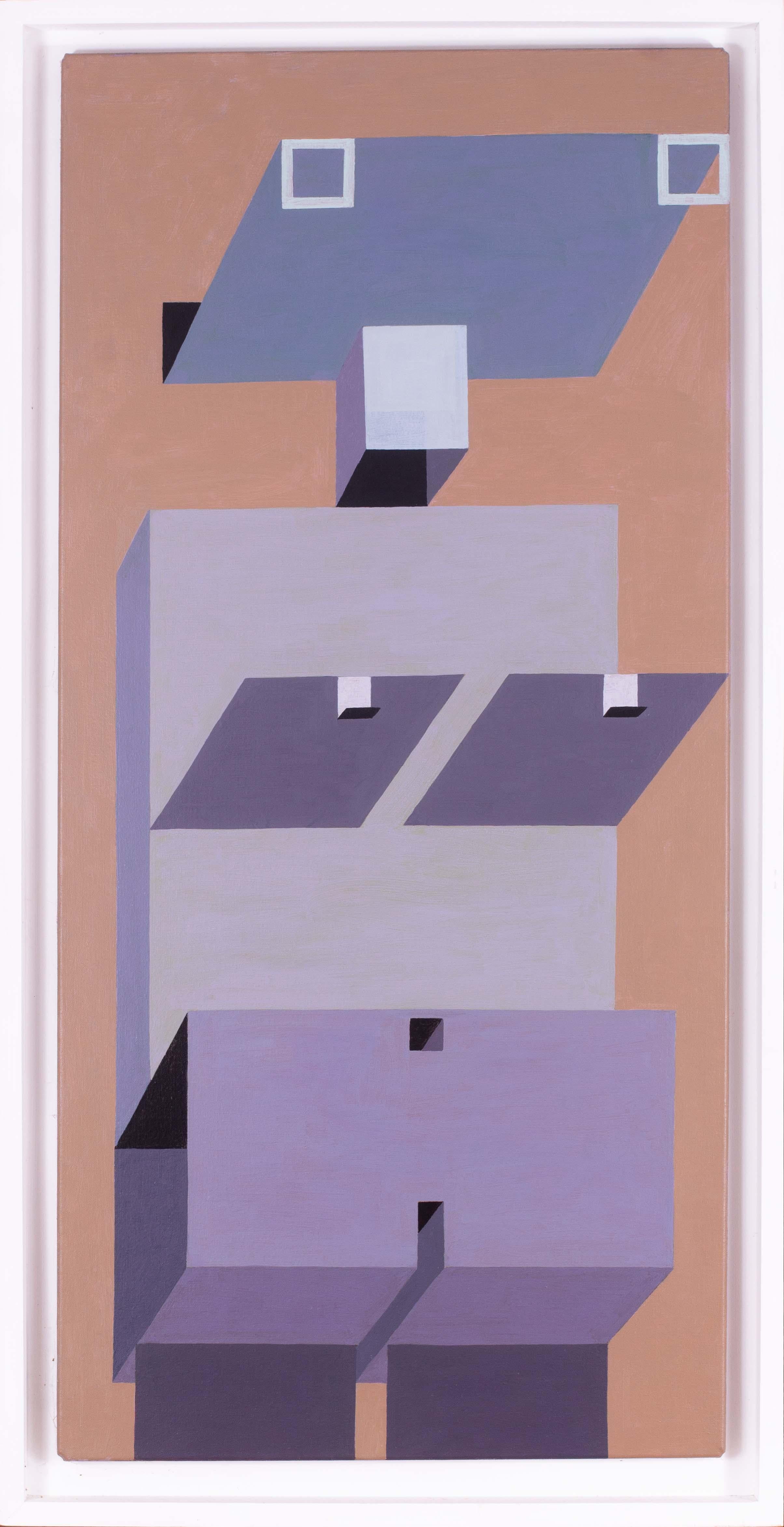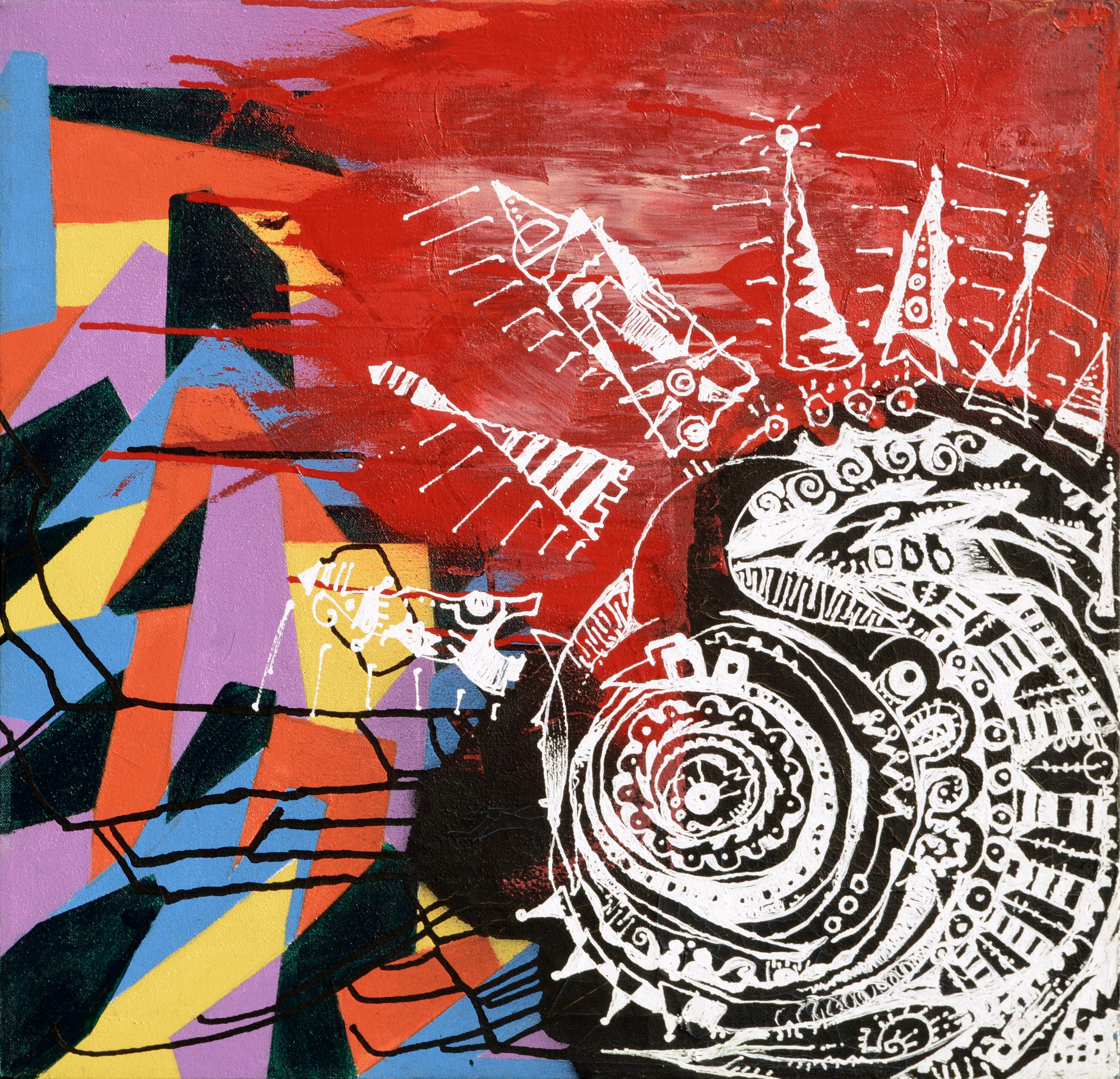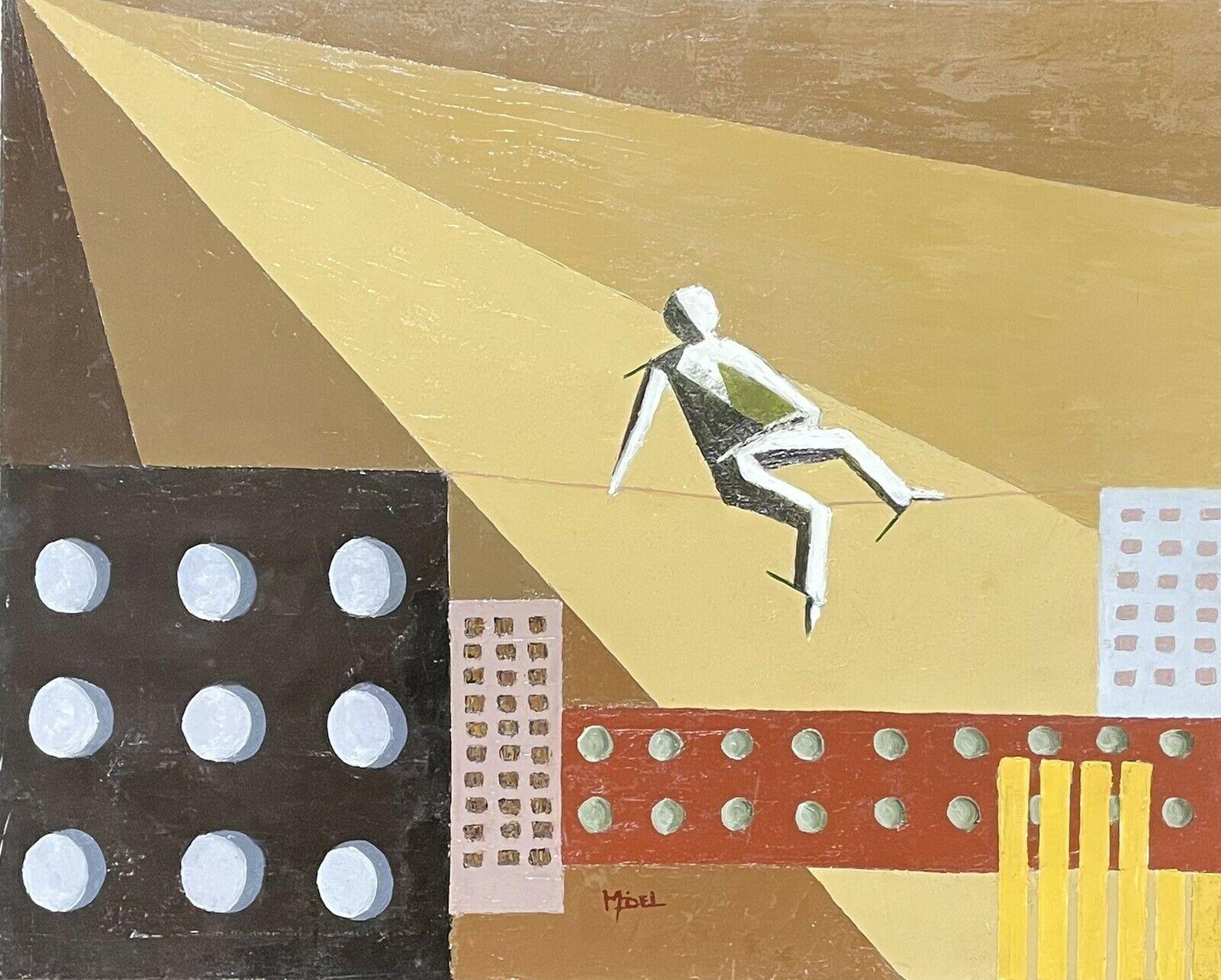Items Similar to Large Scale Abstract Geometric Oil on Canvas, Artist's Lay Figures
Video Loading
Want more images or videos?
Request additional images or videos from the seller
1 of 17
Derek Carruthers Large Scale Abstract Geometric Oil on Canvas, Artist's Lay Figures
About the Item
Large abstract geometric oil on canvas of artist's lay figures intertwined by British artist Derek Carruthers. Unsigned but acquired along with other signed works from the artist's estate and with certificate from the gallery.
A wonderfully playful, colourful and energetic painting, cleverly composed of artist's lay figures emerging from a background of two planes. These figures featured often in this period of the artist's work. An artist lay figure is a doll-like model of the human figure that artists can pose in different ways. It can be used for sketching or as a stand-in for the living subject of a portrait.
"I was given an antique artist’s lay figure and acquired several smaller faceless wooden lay figures. I knew Man Ray’s “Mr. and Mrs. Woodman” series of photographs and enjoyed the irony and humour." So began the series of figure compositions which seem to sustain themselves as symbol and metaphor for aspects of the human condition.
These figures have inhabited Carruthers’ paintings since the early 1990s. They may be placed in a fully-realised 3-D space, their solidity asserted with dramatic lighting; or they may be flat, insubstantial. They may be gathered as a busy community or they may be isolated. They are always featureless. They can be translated as a deliberately ironic comment on life; they are also evidence of the artist’s continuing preoccupation with abstraction. He reduces and manipulates the figures so that they are sometimes in the Romantic tradition, a model of profound humanity, and sometimes - more challenging and chilling - Orwellian tokens of inhumanity.
Derek Carruthers was an artist who persisted in asking questions. His whole career was inspired by the determination to enquire into the nature of art, examine its purpose, and attempt to explore that place where the individual life of the mind meets the external appearance of the world where personal sensation rubs up against cultural assumptions. Not surprisingly, Carruthers explored, over the years, a language of pure form, abstract space, 2 and 3 dimensions, narrative and concept, personal and universal figuration. Looking back, over decades of work, however, each of these voices is pursuing a coherent set of questions, reflecting on the stuff of human experience. Carrthuers’ individual pieces can intrigue and charm, they can be warm and poetic and they can also offer gritty resistance to the easy gaze. They can challenge us to think about ourselves, our environment, our expectations, our place in the world.
Carruthers grew up in the north-west of England having been born in Penrith, and one of his earliest memories of what art might be was formed by his encounter with the extraordinary creations of Kurt Schwitters. The latter had fled Germany in 1937, after his art had been labelled ‘degenerate’. He stayed, first, in Norway and then arrived in Britain in 1940. Carruthers had already encountered Schwitters' work as a boy, and had been launched on his own life-long examination of the nature of art.
Carruthers was further inspired by Victor Pasmore and Hamilton (British Constructivists) who were working closely together at King’s College London and eventually offered a challenging course to all first year students. Thus, Carruthers – who was at King’s in 1953 to 1957 was encouraged to take a rigorous approach to probing abstraction, spatial relationships, and the interlinking of art and architecture.
Having had the good fortune to have been an art student at such a time and in such a place, it is not surprising that Carruthers embarked on a voyage of artistic discovery. He showed his works with the major touring exhibition, organised by the Arts Council, in 1963, ‘Construction England’, together with Pasmore and Mary and Kenneth Martin.
His work was also included in exhibitions of new art at the Drian Galleries, Porchester Place, in 1963 to 1965. Reflecting the more recent re-examination of post-War, British Constructivism, Carruthers’ work was also included in the 1992 show, ‘British Abstract Art of the 50s and 60s’, held at the Belgrave Gallery. This early work, in which solid or relief forms change their nature as they – or the viewers – move through space and time, deliberately challenges the human tendency to find comfort in regarding the world as fixed and knowable.
In these years, too, Carruthers taught at Sunderland and Leicester Colleges of Art, before moving to lead the Fine Art course, as a Professor, at Trent Polytechnic (now the Nottingham Trent University). He was a dedicated educator, leaving to pursue his own art, full time, only in the mid 1980s.
Inspired, perhaps, by this freedom, the 1980s saw Carruthers exploring new ideas. He turned from working in 3-dimensions, or collage and relief, and rediscovered the power of traditional materials, oil and watercolour, on canvas and paper. He moved away from Non-Objectivity towards a practice which explored both abstracted and figurative imagery. Throughout, he remained preoccupied with exploring the human condition: by this trite remark, we mean that he continued to question how each individual experiences the world; he explored the ways in which human beings create totems to make their mark, as if to claim immortality; he tries to, ‘symbolise the triangular relationship between humankind and religion and the art / architecture which it inspires’. Hence - as well as warm glimpses of holidays and home life - his work yields the Egyptian pyramid, the Graeco-Roman heroic figure, the Christian monument; and, ultimately, the ‘sexless, ageless, raceless anonymity’ of the artist’s lay figure.
Derek Carruthers continued to ask questions, both about his life in a particular time and place, and about the lot of the human being on a universal scale. As an artist and a scholar, he saw himself at the intersection of these challenging states. And he makes you think........
- Creator:Derek Carruthers
- Dimensions:Height: 35.83 in (91 cm)Width: 47.84 in (121.5 cm)Depth: 0.79 in (2 cm)
- Medium:
- Movement & Style:
- Period:
- Condition:
- Gallery Location:Cotignac, FR
- Reference Number:
About the Seller
5.0
Platinum Seller
These expertly vetted sellers are 1stDibs' most experienced sellers and are rated highest by our customers.
Established in 2000
1stDibs seller since 2020
155 sales on 1stDibs
Typical response time: <1 hour
- ShippingRetrieving quote...Ships From: Cotignac, France
- Return PolicyA return for this item may be initiated within 3 days of delivery.
More From This SellerView All
- 'Allez!' At the Match. Toulon Rugby Club. Large Expressionist Oil on Canvas.Located in Cotignac, FRLarge abstract expressionist oil on canvas of Toulon Rugby Club supporters at a rugby match. Unsigned. Extremely vibrant and energetic depiction of Toulon ...Category
Late 20th Century Abstract Expressionist Abstract Paintings
MaterialsCanvas, Oil
- "La Corrida", "The Bull Run", French Abstract Expressionist Oil on Board.Located in Cotignac, FRLate 20th century abstract Expressionist oil on board by French artist Emmanuelle Bardet. Signed bottom right and dated 95 and titled "La Corrida" to the reverse along with a dedicat...Category
Late 20th Century Abstract Expressionist Abstract Paintings
MaterialsOil, Board
- 'Assemblées', Figures In Motion, Oil on Paper on Board.Located in Cotignac, FRAbstract impressionist oil on paper on board by French artist Chantal Payet. Signed and dated April '96 to the reverse. An interesting and challenging Abstract Impressionist work in...Category
1990s Abstract Impressionist Abstract Paintings
MaterialsPaper, Oil, Board
- French Art Brut Abstract Expressionist Acrylic on Canvas, 'Qui Dit Mieux'.Located in Cotignac, FRLarge outsider art abstract expressionist acrylic on canvas by French artist Serge Desfarges. Signed and dated to the bottom left and signed, dated and titled to the reverse. Present...Category
Late 20th Century Outsider Art Abstract Paintings
MaterialsCanvas, Acrylic
- 'Motherhood' A Redhead Beauty with Children. Mid-century Oil on Paper.Located in Cotignac, FRMid-century post modern oil on paper of a woman with children. Signed and dated 1948 to the bottom left, (the artist as yet undiscovered). An arrestin...Category
Mid-20th Century Post-Modern Figurative Paintings
MaterialsPaper, Oil
- J'adore, Large Scale Expressionist Graffiti, Street Art Drip PaintingLocated in Cotignac, FRFrench early 21st Century Graffiti, street art, 'drip' painting on paper by Jonas “SUN7” Bournat. The work is signed and titled to the backboard. Presented in fine wood, glass and cl...Category
21st Century and Contemporary Expressionist Figurative Paintings
MaterialsPaper, Watercolor, Gouache
You May Also Like
- 'Carmelita' - Young Woman with Flowers - Vibrant Abstract Geometric CubismLocated in Carmel, CA"Carmelita" by Robert Glick is a captivating 36" x 36" oil on canvas that marries the abstract with the geometric and the vibrancy of figurative art. This...Category
2010s Abstract Geometric Figurative Paintings
MaterialsCanvas, Oil
- The Brissons, Harriet Hoult, 2021, Original Framed Mixed Media Painting,By Harriet HoultLocated in Deddington, GBThe Brissons [2021] Original Abstract Mixed Media Acrylic, Oil On Canvas Image size: H:113 cm x W:77 cm Complete Size of Unframed Work: H:113 cm x W:77 cm x D:0.1cm Framed Size: H:13...Category
21st Century and Contemporary Abstract Geometric Abstract Paintings
MaterialsCanvas, Oil, Acrylic
- The Warrior and the Star Precedes the Sun (Hopi Ceremony, Oraibe, Arizona)By Charles Stewart, 1922-2011Located in Denver, CO20th Century Southwestern Native American oil painting Hopi Ceremony in Oraibe, Arizona by New Mexico artist, Charles C. Stewart (1922-201...Category
Mid-20th Century Abstract Geometric Abstract Paintings
MaterialsCanvas, Oil
- British Abstract geometric figure in greys by Ron SimsLocated in Petworth, West SussexRon Sims (British, 1944 – 2014) Ghost Oil on canvas 48.1/4 x 22.5/8 in. (122.5 x 57.5 cm.)Category
20th Century Abstract Geometric Figurative Paintings
MaterialsOil, Canvas
- Abstract Geometric CompositionBy Nick O'ConnorLocated in Soquel, CABold geometric abstract painting by Nick O'Connor (American, late-20th Century). Signed, numbered, and dated "#1 Nick O'Connor 2002" on verso, with an inscription that reads "Hinduis...Category
Early 2000s Abstract Geometric Abstract Paintings
MaterialsCanvas, Oil, Spray Paint
- CONTEMPORARY FRENCH CUBIST ABSTRACT - GEOMETRIC COMPOSITION - TIGHTROPE WALKERLocated in Cirencester, GloucestershireArtist/ School: French School, signed and dated 2008 Title: The Tightrope Walker Medium: oil painting on canvas Size: painting: 25.5 x 32 inches Provenance: private collec...Category
21st Century and Contemporary Abstract Geometric Abstract Paintings
MaterialsCanvas, Oil
Recently Viewed
View AllMore Ways To Browse
Jack Craig
Joseph Walsh Studio
Carrot Painting
Figurative Garden Oil Paintings
Mid Century Women Portraits Painting
Fran Light
Isaac Monteiro
Figural Painting Unsigned
Young Woman In Pink
Ron Childers
Contemporary Mixed Media Surreal Nude
French Girls School
Larry Miller
Romanian Des
Jane March
Soviet Union Art
Games And Reading Picasso
Eric Kennington
